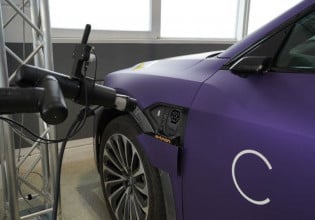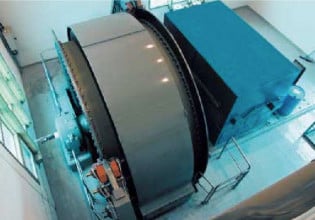Linear Tech Introduces Synchronous Step-Down DC-DC Controller with I2C/PMBus Digital Power System Management & Onboard EEPROM
Linear Technology Corp. announced the LTC3883/-1, a synchronous step-down dc-dc controller with an I²C-based PMBus interface for digital power system management. This device combines best-in-class current-mode switching regulator performance with precision mixed signal data acquisition for unsurpassed ease of power system design and management. It is supported by the LTpowerPlay™ software development system via an easy-to-use graphical user interface (GUI).
The LTC3883 allows for digital programming and read back for real-time control and monitoring of critical point-of-load converter functions. Programmable control parameters include output voltage, margining and current limits, input and output supervisory limits, switching frequency and tracking. On-chip precision data converters and EEPROM enable the capture and nonvolatile storage of regulator configuration settings and telemetry variables, including input voltage and current as well as output voltage and current, duty cycle, temperature and fault logging.
Configurations for the LTC3883 are easily saved to the internal EEPROM over the device’s I²C serial interface, using Linear Technology’s LTpowerPlay GUI-based development software. With configurations stored on-chip, the controller can power-up autonomously without burdening the host processor. Default settings can be optionally configured by external resistor dividers for output voltage, switching frequency, phase and device address. Multiple designs can be easily calibrated and configured in firmware to optimize a single hardware design for a range of applications.
The LTC3883 can be configured for up to 6 phases that can be interleaved and paralleled for accurate sharing among multiple ICs, minimizing input and output filtering requirements for high current and/or multiple output requirements. Applications include high current ASIC, FPGA and processor supplies in telecom, datacom, computing and storage markets.
The LTC3883 features high current integrated gate drivers to drive N-channel power MOSFETs from input voltages ranging from 4.5 to 24V. It can produce ±0.50% accurate output voltages from 0.5 to 5.5V with output currents up to 30A per phase over the full operating temperature range. An integrated amplifier provides true differential remote output voltage sensing, enabling high accuracy regulation, independent of board IR voltage drops. Highest efficiency is achieved by sensing current using the voltage drop across the output inductor (DCR), or an external sense resistor can be optionally used. Programmable DCR temperature compensation maintains an accurate and constant current limit over a broad temperature range. The device’s minimum on-time of just 90nsec makes the LTC3883/-1 well suited for compact high frequency/high step-down ratio applications. Accurate timing across multiple chips and event-based or time-based sequencing allow the optimization of power-up and power-down of complex, multiple rail systems. Additional features include storage of identification and traceability data, cycle-by-cycle current limit, adjustable soft start, a synchronizable switching frequency, and programmable GPIO pins to indicate part status and to provide autonomous recovery from faults.
The LTC3883 features an onboard LDO for controller and gate drive power, and the LTC3883-1 allows for an external bias voltage for highest efficiency. Both parts are available in a thermally enhanced 5 x 5mm QFN-32 package. The extended temperature range grade is specified over a -40 to 105°C operating junction temperature range. The industrial grade part is specified over a -40 to 125°C operating junction temperature range. Pricing starts at $4.82 each in 1000-piece quantities and both versions are available from stock.
More news and information regarding the latest developments in Smart Grid electronics can be found at Darnell’s SmartGridElectronics.Net.






